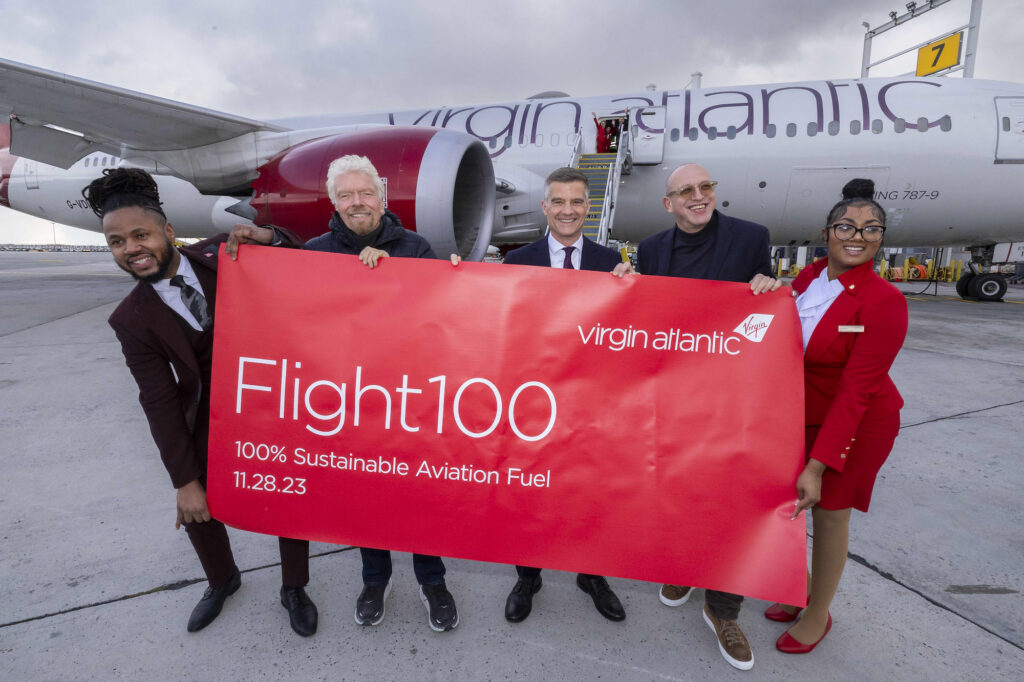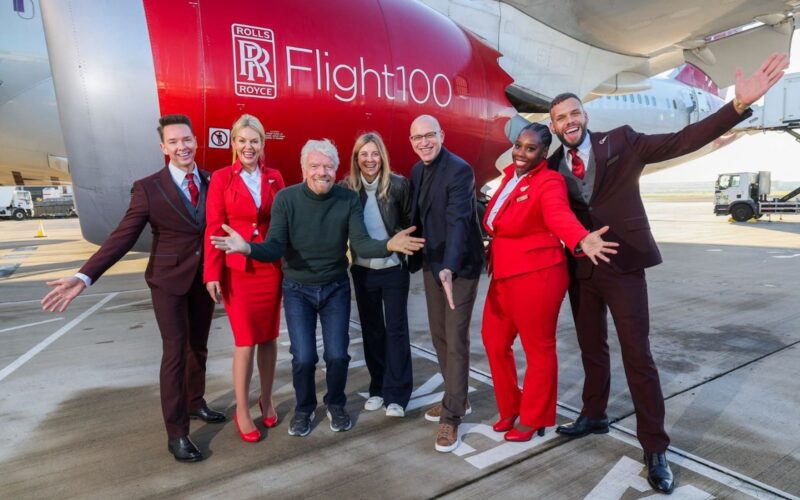“The world will always assume something can’t be done… until you do it.”
This is what Sir Richard Branson, founder of the Virgin Group, wrote on his blog before he boarded Virgin Atlantic’s Flight 100, the first-ever transatlantic flight by a commercial airline to be powered by 100% sustainable aviation fuel (SAF).
Branson is joined on the flight by UK Transport Secretary Mark Harper, who told Sky News that the flight is a big step forward in paving the way for ordinary people to fly cost-effectively “in a way that is consistent with protecting the environment”.
“This Government has backed today’s flight to take-off and we will continue to support the UK’s emerging SAF industry as it creates jobs, grows the economy and gets us to Jet Zero,” Harper said in a press release.
Flight VS 100 departed London-Heathrow Airport (LHR) at approximately 11:30 local time, and is estimated to arrive in New York’s John F Kennedy Airport (JFK) at 14:22 local time on the same date.
The historic flight was flown on one of the carrier’s Boeing 787, which is powered by Rolls-Royce Trent 1000 engines.
According to Virgin Atlantic, the fuel used on Flight 100 is made from waste products, delivers CO2 lifecycle emissions savings of up to 70%, while performing like the traditional jet fuel it is designed to replace.
The SAF used on Flight100 is a unique dual blend consisting of 88% HEFA (Hydroprocessed Esters and Fatty Acids) supplied by AirBP and 12% SAK (Synthetic Aromatic Kerosene) supplied by Virent, a subsidiary of Marathon Petroleum Corporation.
The HEFA is made from waste fats while the SAK is made from plant sugars, with the remainder of plant proteins, oil and fibers continuing into the food chain. SAK is needed in 100% SAF blends to give the fuel the required aromatics for engine function.
“Virgin Atlantic has been challenging the status quo and pushing the aviation industry to never settle and do better since 1984. Fast forward nearly 40 years, that pioneering spirit continues to be Virgin Atlantic’s beating heart as it pushes the boundaries from carbon fiber aircraft and fleet upgrades to sustainable fuels,” Branson said in a press release.
Branson added: “I couldn’t be prouder to be onboard Flight100 today alongside the teams at Virgin Atlantic and our partners, which have been working together to set the flight path for the decarbonisation of long-haul aviation.”
UK Prime Minister Rishi Sunak also took to social media to express his support and “excitement” over Flight 100.
“Our government made up to £100 million available to support the project, and right now, it’s taking off. Today’s Virgin Atlantic flight to New York will be entirely fuelled by SAF made primarily from waste oils and fats. Not only will SAF be key in decarbonizing aviation, but it could create a UK industry with an annual turnover of almost £2.5 billion, which could support over 5,000 jobs,” Sunak said on his Instagram account.
VS 100 safely lands
After a flight time of 7 hours and 16 minutes, flight VS 100 safely landed in JFK airport at 14:13 local time, 37 minutes earlier than expected.

While Flight 100 is the first SAF-powered transatlantic flight to be conducted by a commercial airline, long-haul flights have previously been carried out using blended SAF.
The most recent was Emirates in early November 2023, using 315,000 gallons of blended SAF provided by Shell Aviation, for a Dubai Airport (DXB) to Sydney Kingsford Smith Airport (SYD) flight.
On November 19, 2023, US aircraft manufacturer Gulfstream Aerospace became the first organization worldwide to complete a transatlantic flight powered solely by SAF using a Gulfstream G600 aircraft.

